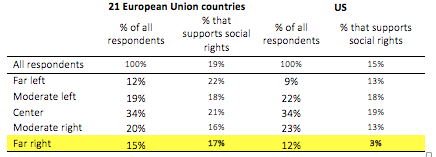Do Americans Care Less than Europeans about Protection from Poverty and Inequality?
Connect with the author
Recent debate about the Affordable Care Act has shown how difficult it is to reach agreement about healthcare coverage for U.S. citizens. Although universal healthcare is taken for granted in most countries in Western Europe, it continues to be a heated topic of debate in U.S. politics. How can this clear difference between the United States and these other major, industrialized countries be explained? New evidence suggests that the prominence of the healthcare debate is not just a matter of party strategy—it also reflects deep cleavages in U.S. public opinion.
In a newly published research article we report on a survey about democratic values we implemented in the United States. The survey parallels a study of 29 European countries that asked comprehensive questions about which values citizens deem the most important for democracy in their countries—including questions about protection from poverty and income inequality.
Support for Social Protections in the United States and Western Europe
Support for social security and wealth redistribution is indeed lower among U.S. citizens than among Europeans. This finding comes as no surprise. As the following table shows, among 11 possible priorities listed, the average American considers the two least important to be protection from poverty and government efforts to reduce difference in income levels. In contrast to their European counterparts, U.S. citizens clearly have lower expectations that government will protect all citizens from poverty.
Research on this topic often assumes that public support will rise once social security benefits are implemented. The assumption seems to hold for Western Europe, which has had more than a century of experience with broad social security policies. Citizens in countries with protections against poverty and inequality say they are important to democracy.
In the United States, on the other hand, the Affordable Care Act has had only a couple of years to earn legitimacy and acceptance. Based on a uniquely comprehensive and cross-nationally comparative survey conducted between 2012 and 2014, our research shows that the social conception of full citizenship—one that includes government protection from poverty and income inequality in a citizen’s rights—had much less support in the United States than in Europe. Since recent research by scholars like Suzanne Mettler and Lawrence Jacobs shows growing public support in the US for government efforts in health insurance, an important area for future research will be to learn whether this US-European gap in support for social protection narrows over time.
Support of Social Rights by Left-Right Political Identity
Our most important finding is that support for broad social security policies is distributed differently across the left-right political spectrum in the United States than in Europe. Although fighting poverty is usually seen as a left preference in the United States, this preference holds across the political spectrum in Europe—where a consensus bridges ideological divides.
In the United States, by contrast, all groups support fighting poverty and inequality, except for those who identify as far right. Startlingly, only three percent on the U.S. far right support this goal.

To phrase it differently: In the United States we observed a distinct group that opposes government intervention to reduce poverty. This group is substantial, because 12 % of all U.S. respondents identify as far right; and it is also highly vocal and well-organized enough institutionally to have gained veto power in certain political debates. Although a large majority of the U.S. population favors government intervention to protect citizens from poverty and inequality, this broad support is lukewarm when compared to European support for similar policies. This means that public ambivalence, combined with well-organized right-wing institutional structures, afford the U.S. far right a window of opportunity to impose their views on the political decision-making process and prevent the creation and implementation of policies that would reduce poverty and inequality.
Healthcare as an Example
In sum, our research finds that U.S. public opinion is less supportive of broad social security programs than European public opinion—but makes it clear that a substantial group of U.S. citizens would like the government to do more to reduce poverty and inequality. Public reactions to the attempted repeal the Affordable Care Act—which threatened to leave 20 million people without the protections they had come to expect—shows that support for broad governmental protections against poverty and inequality can exist in the United States, especially in cases where the public already has experience with a policy or protection.
Read more in Jennifer Oser and Marc Hooghe, "Give Me Your Tired, Your Poor? Support for Social Citizenship Rights in the United States and Europe." Sociological Perspectives (2017).

